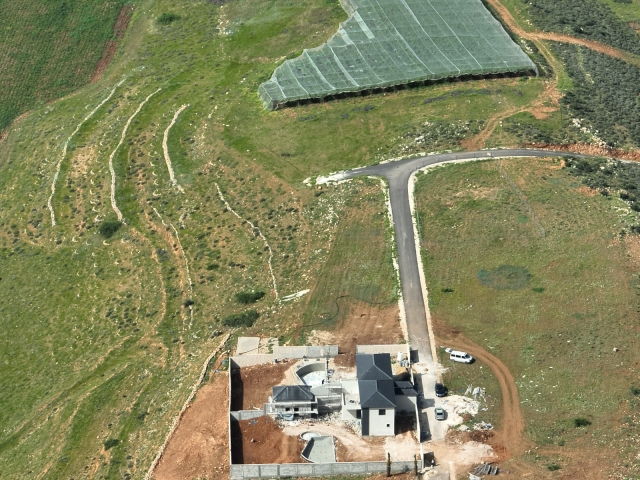The Palestinian Authority paved a road and built a residential building in El-Onok, a heritage site from the biblical time of Joshua’s entrance to the land of Canaan. The site is one of the most important remaining archaeologically significant areas from the first Iron Age period in Samaria.
The Palestinians have a long history of destroying archaeological sites tied to ancient Israel and Judea in an effort to 'cleanse the land of Jewish historical presence' as it had been described. The policy continued a Jordanian policy of trying to erase Jewish presence in the land. After 1948, Jordan expelled all Jews from eastern Jerusalem and began to build neighborhoods on top of the Mount of Olives, an ancient cemetery. It is not uncommon to find homes in Silwan with caves in the backyard where ancient ossuaries are found or in one complex, there is a gravesite with a stone dating back 2800 years in the center of the building's courtyard.
רשיון להשמיד
— שומרים על הנצח (@ShomrimNetzach) May 2, 2023
אתר הגילגל בנחל תרצה, אל עונוק, אחד משישה בלבד, כמעט שנהרס ואבד לנצח.
אתרי הגילגל הם תופעה נדירה של אתרי מתחם בצורת כף רגל, מימי ראשית ישראל.
לא כולם נחפרו, ואם לא נתעורר לא נוכל להבין את התופעה המדהימה הזו, שייחודית לישראל.
עצוב. https://t.co/063Wk3JGDX
El-Onok is one of the six "Gilgal" sites identified by the late archaeologist and researcher Professor Adam Zertal as sites associated with the period of the beginning of Israel in the days of Joshua. The site located in Area B according to the Oslo Accords, is under Palestinian civil jurisdiction and Israeli security control. It is located in the Tirzah River area which drains into the Jordan River, and from there to the Dead Sea.
Now the site is in immediate danger of destruction, due to construction being carried out by the Palestinian Authority, which has already paved roads in the compound. According to reports by the Israeli right-wing organization “Keepers of the Eternal”, a few weeks ago, serious damage to the site was discovered following paving and infrastructure works, which appear to be in preparation for a residential neighborhood.
Dr. Shai Bar, a lecturer at the University of Haifa and director of the archaeological survey project at the site, warned: "This is very destructive damage to an important site from the Iron Age, which was published in the archaeological survey of Mount Menashe many years ago."
According to him, "Construction on an ancient site without taking the necessary preservation operations is an unimaginable waste, which indicates the lack of governance of the entity that is supposed to monitor that such events do not occur in the areas under its responsibility. Those responsible should immediately stop the continuation of construction and try to save the information from the damaged site."
Palestinian Authority taking over and destroying Hasmonean fortress
— Jeffrey Zimmerman (@Zimmlaw175) May 11, 2020
The Palestinians continue to destroy Jewish archeological sites and false claim Jewish historic sites as their own. They are literally stealing Jewish history to buttress their own lies. https://t.co/5tyLTvewzv
According to the director of activities at Keepers of the Eternal, Adi Shargai, "Building on top of an archaeological site means its complete destruction, which cannot be restored, and the information about it is lost forever. This site, one of the most important witnesses to the beginning of the nation of Israel, has only been surveyed and has not yet been excavated .”Nahal Tirzah
"Until now, the Israeli Civil Administration has refused to act on sites in Area B, on the grounds that they are Palestinian civil authorities. This is a site of global and national heritage value, and Israel has a moral and legal obligation to act to protect it. The Israeli government must intervene immediately and demand from the Palestinian Authority and the European countries that contribute to the project to immediately stop the construction. The Oslo Accords also do not give the PA authority to destroy world heritage sites."


